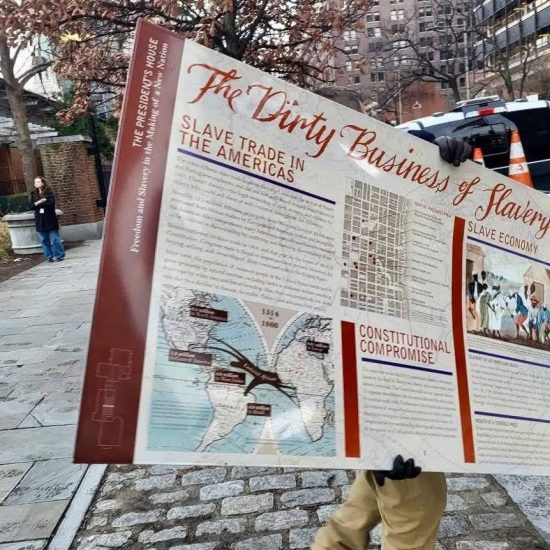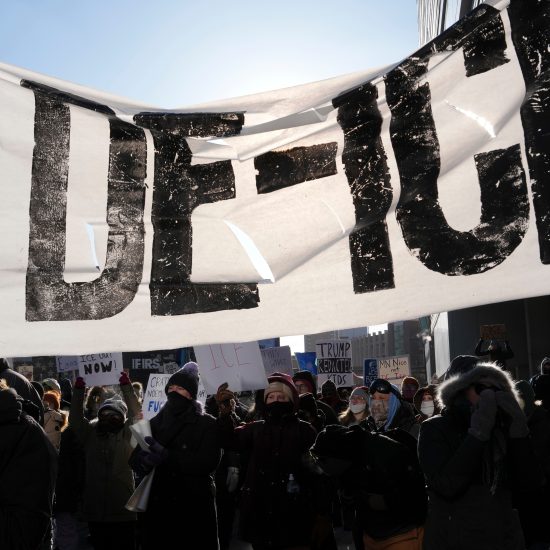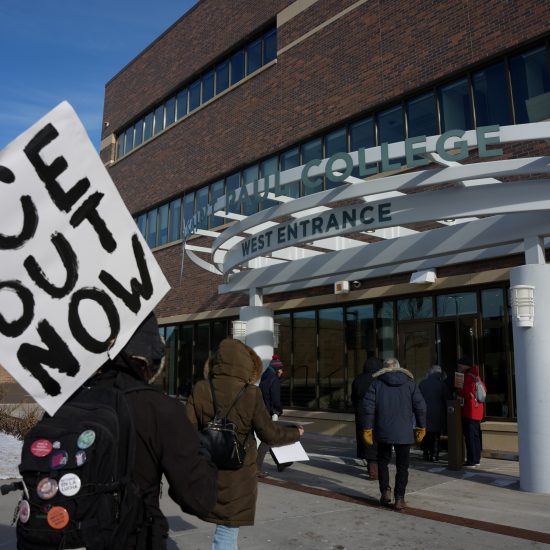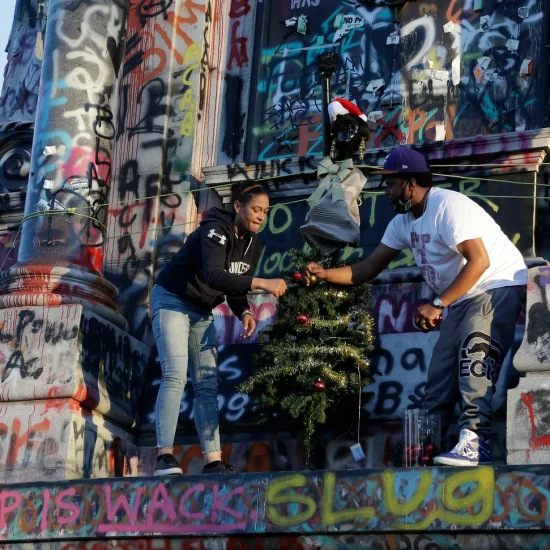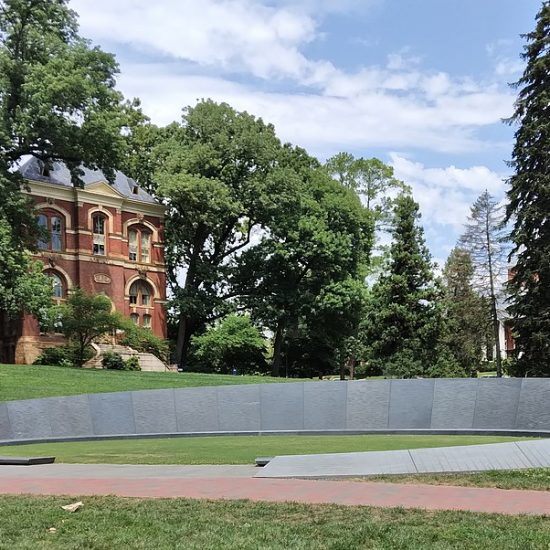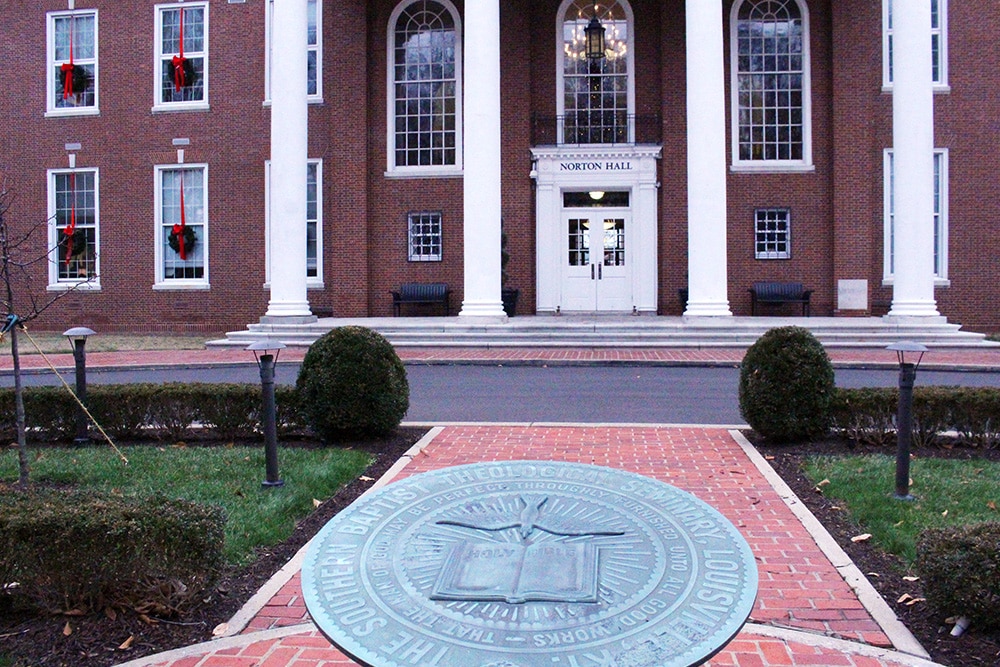
As some Black Southern Baptists urge Southern Baptist Theological Seminary in Louisville, Kentucky, to remove from campus buildings the names of its founders who were enslavers, a Black student there is challenging the claim there aren’t monuments on campus. In addition to building names, SBTS also features the images of its founders on campus and on merchandise like mugs.
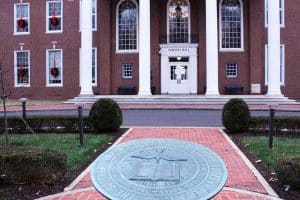
Norton Hall houses the president’s office at Southern Baptist Theological Seminary in Louisville, Kentucky. (Adelle M. Banks/Religion News Service)
Al Mohler, SBTS president, insists he won’t remove the names of the school’s four founders — James Boyce, John Broadus, Basil Manly Jr., and William Williams — from buildings because he defends the theology of the four men, who in total enslaved more than 50 individuals and supported the Confederacy. Mohler also claimed “we don’t have statues or monuments” of the four on campus.
Kyle Howard, a graduate of the school and current student, argued on Twitter Monday (July 6) it wasn’t true to say “there are no monuments to white supremacy or the Confederacy at SBTS.” He said that while there aren’t statues on campus, there are other memorials.
“There are absolutely white supremacist monuments at SBTS,” he explained. “The buildings at SBTS & the name of the undergrad school itself are monuments.”
Others have also insisted the building names are monuments to white supremacy and the Confederacy, including Dwight McKissic, pastor of Cornerstone Baptist Church in Arlington, Texas; and SBTS graduate Kevin Cobsy, president of Simmons College of Kentucky created and originally led in Louisville by formerly-enslaved Black Baptists like William J. Simmons.
In addition to building names, Howard also noted the faces of the founders can be seen across campus.
“If you were to walk into the SBTS bookstore or clothing store/mail room, you will see white supremacist and Confederate profiles on mugs, shirts, & a host of other items for sale,” he added. “I have to see the faces of slave masters every time I walked down the halls as someone would have them on their shirt or maybe their coffee mug.”
Howard called this worse than if there were a statue of Boyce on campus since he could avoid that one spot in his walking route. But he couldn’t avoid “his face every time I went to buy books or pick up mail.”
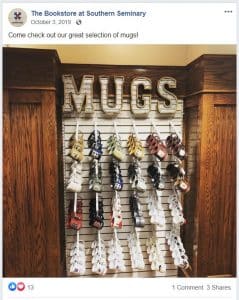
Screengrab of SBTS Bookstore Facebook post, October 3, 2019, that shows mugs with images of founders on the top row.
SBTS did not respond to Word&Way requests for comment confirming the merchandise with images of its founders or addressing if they felt it was appropriate to sell such items with the faces of enslavers. An image of mugs with the founders was posted to the SBTS bookstore’s Facebook page in October. And an image in a research project by University of Notre Dame sociologist Lisa Weaver Swartz shows a bobblehead of Mohler between a Boyce mug and a Williams mug.
Howard hopes his alma mater will show biblical repentance by removing the honors to enslavers.
“SBTS is a seminary,” he explained. “Its job is to train future pastors. They teach students repentance requires both naming sin, turning away, & putting on righteous counterpart (Eph 4:25-32). The most baseline act of repentance SBTS could do is rename buildings, school, & remove monuments.”
Others are also asking questions about how SBTS honors its founders despite their roles as enslavers. Daniel Burke, religion editor for CNN, tweeted Monday (July 6) he asked SBTS last week about “why the online biographies of its founders did not mention that they owned slaves.” He noted “they’ve now added two lines,” but added, “I’m curious if people think it’s enough.”
“Any historical record of the founders of the Southern Baptist Convention, and The Southern Baptist Theological Seminary, is incomplete without an honest telling of their complicity in American slavery and racism,” the online biographies now say, along with a link to its 2018 report for people to learn more “on that story.”
While that report does detail much of the school’s ties to slavery and the Confederacy, it still lacks some names — names that aren’t honored on campus either. The report mostly leaves unstated the names of those enslaved by SBTS’s founders, even though it cites records that provide some names. A man enslaved by Manly is named in the report: Ben. But SBTS’s report spends several sentences talking about a couple enslaved by Boyce without naming them: George and Fanny.
Furman University in Greenville, South Carolina — where SBTS was founded before moving to Louisville — previously conducted a similar study about its ties to slavery. Afterward, the school announced it would name a prominent space on campus the Abraham Sims Plaza in honor of a man enslaved by the school’s founder.


